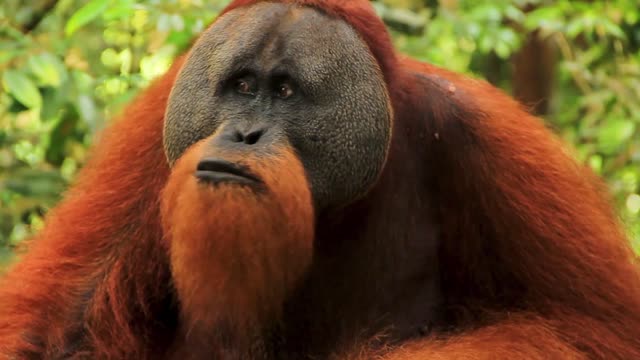Premium Only Content

Meet the Orangutan: The Indonesian Species That Is Threatened with Extinction
The orangutan is one of the most recognisable species that are threatened with extinction in the wild. These large, red-haired apes are found in the forests of South East Asia and are known for their intelligence, shyness and propensity for climbing trees. Intentionally cryptic and shy, orangutans live a solitary life. Each adult has its own exclusive home range that it will not leave unless it needs to find a mate. With dense rainforests on Borneo and Sumatra rapidly being destroyed due to logging and palm oil production, the future of these amazing creatures remains bleak. Here is more about these elusive primates:
What is an Orangutan?
The word “orangutan” translates as “person of the forest” in the Malay language, a reference to the species’ strong connection to nature. Often abbreviated to “orang”, these primate species are the only members of their genus, “Pongo”. Other than humans, orangutans are the only known species that are able to create and use tools. As such, they are often referred to as “the gentle giant of the forest”. Orangutans are the largest tree-climbing animals in the world. They are about twice as heavy as humans and have orange-brown hair. In the wild, orangutans can live up to 40 years and up to 60 years in captivity. Females have their first offspring at 14 years old and can have offspring until they are over 50.
Where Can We Find Orangutans?
Orangutans thrive in tropical rainforests, with the Bornean species being found in the lush forests of Malaysia and the Indonesian species residing in the trees of the Indonesian island of Sumatra and the surrounding islands. The Sumatran orangutan has been listed as critically endangered since 2002, receiving this status due to the rapid destruction of its habitat.
What Is Causing The Decline of the Orangutan?
The main reason that orangutans are endangered is habitat loss. The destruction of these tropical rainforests for the production of palm oil, paper pulp, and other products is having a devastating impact on the orangutan population. Forest fires, illegal logging, and poaching are all issues that are significantly affecting this species. While orangutans are protected by law in their native countries, the implementation of these laws is often inadequate. Another major threat to orangutan survival is the growing popularity of wildlife tourism. Studies have shown that seeing these apes in the wild has a severely negative impact on their general health, particularly their reproduction rates.
Why Are Orangutans Endangered?
There are many reasons why orangutans are endangered but most come down to one main issue: destruction of their habitat. Indonesia, Malaysia and other tropical countries in Southeast Asia are home to tropical rainforests that are among the richest and most biodiverse ecosystems in the world. Unfortunately, however, these forests have been under serious threat from deforestation for decades. The clearing of tropical rainforests for agriculture and other uses has resulted in the destruction of orangutan habitat, and has, unfortunately, resulted in a dramatic decline in orangutan populations as well. Indeed, these apes are currently listed as “endangered” on the IUCN Red List of Threatened Species due to their rapidly declining numbers.
Where Can We See Orangutans?
There are many places you can go to see orangutans in the wild. Sumatra is home to the critically endangered Sumatran orangutan, while Borneo is home to the Bornean orangutan, which is listed as endangered by the IUCN. You can see orangutans in the wild at rehabilitation centres in Borneo and Sumatra. The best time of year to see orangutans in Borneo is June to October, when they are in the wild harvesting fruit. The best time to see orangutans in Sumatra is May to August, when they are out in the wild.
How You Can Help!
The orangutan is one of the most critically endangered species in the world. The best thing that you can do to help orangutans survive is to spread awareness about the pressing threats that they face. If everyone works together towards this goal, we can help orangutans thrive once more. One of the most important things that you can do for orangutans is to boycott products that are made using palm oil. Palm oil is a common ingredient in many products that humans use, including cosmetics, cleaning supplies and foods, and is also used in biofuels. With deforestation being the main driver of orangutan habitat loss, protecting these forests is a critical part of saving this species from extinction. You can help by getting involved with local organisations that work to protect these forests, such as the World Wildlife Fund, or even by planting trees in your own backyard.
-
 LIVE
LIVE
SpartakusLIVE
2 hours ago#1 Rocket CHAMPION of Verdansk wields UNSTOPPABLE new META
305 watching -
 LIVE
LIVE
Barry Cunningham
2 hours agoPRESIDENT TRUMP MADE TODAY A VERY BAD DAY TO BE A DEMOCRAT!
7,170 watching -
 1:45:02
1:45:02
Glenn Greenwald
3 hours agoIsrael Slaughters More Journalists, Hiding War Crimes; Trump's Unconstitutional Flag Burning Ban; Glenn Takes Your Questions | SYSTEM UPDATE #504
68K46 -
 DVR
DVR
Stephen Gardner
46 minutes ago🔥'Burn ALL TRUMP FLAGS’ says Tim Walz + Democrat CAUGHT rigging own election!
2191 -
 10:10
10:10
robbijan
1 day agoHollywood’s Hidden Messages: Predictive Programming & What’s Next
1.13K3 -
 40:13
40:13
MattMorseTV
2 hours ago $3.62 earned🔴It's EVEN WORSE than we thought...🔴
12K37 -
 LIVE
LIVE
The Jimmy Dore Show
3 hours agoSnoop Dogg Is DONE w/ LBGTQ+ Propaganda In Kids Movies! Trump Outlaws Burning the U.S. Flag!
7,176 watching -
 LIVE
LIVE
MissesMaam
4 hours agoDying Light w/ Da Bois💚✨
135 watching -
 LIVE
LIVE
Sgt Wilky Plays
1 hour agoThe Finals with the Pack
38 watching -
 32:55
32:55
Clickbait Wasteland
9 hours ago $0.21 earnedAsking New Yorkers Who They Support For Mayor: Wall Street
3.29K1